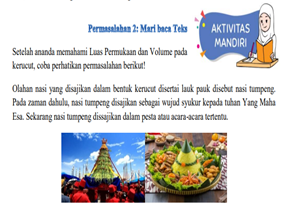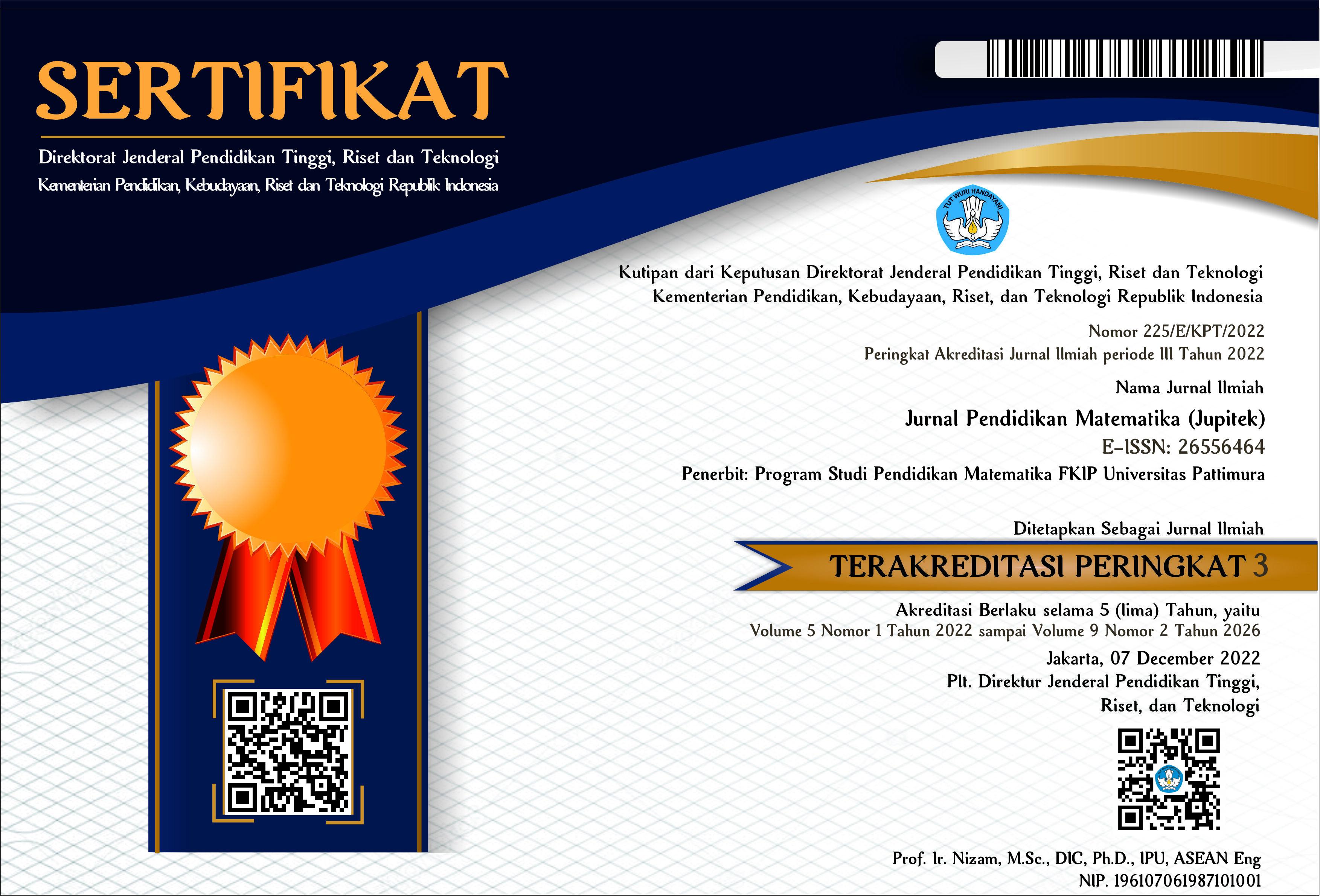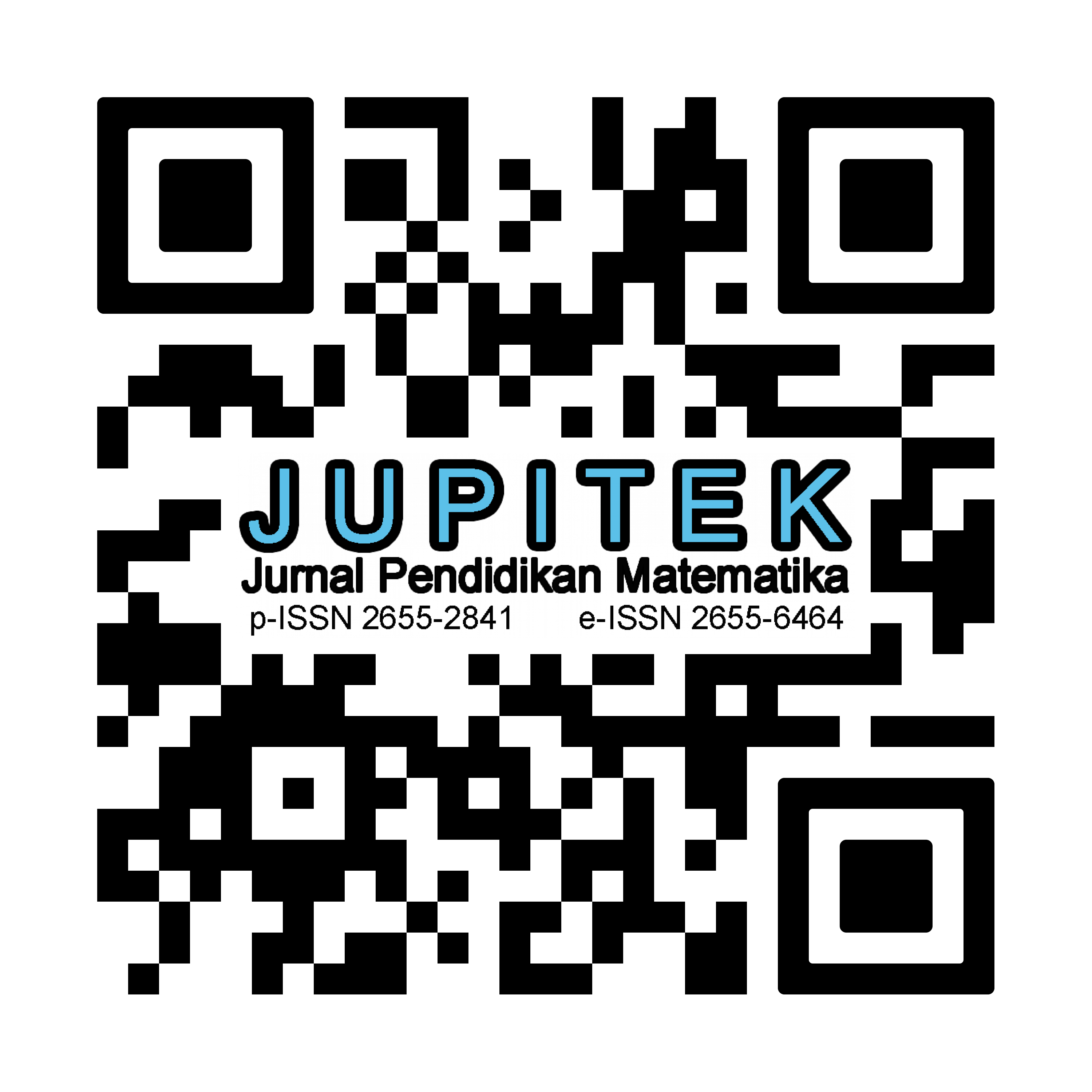Development of Module Based on Higher Order Thinking Skills on Cylinder and Cone Matter
Abstract
This study aims to develop a valid, practical, and effective Higher Order Thinking Skills-based learning module on Cylinders and Cones for SMP NU Sumenep seventh-grade students. This type of research is research and development with the ADDIE model (Analysis, Design, Development, Implementation, Evaluation). Data were collected using tests and questionnaires. Material and media experts validated the results. The results of the study show: 1) the validity aspect obtained an average of 87.5% with the criteria of "very good", 2) The practicality aspect seen from student assessments after using the learning module, obtained an average of 84.5% with the criteria of "good", 3) The effectiveness aspect seen from the results of students' mathematical problem-solving abilities, obtained an average of 76% with the criteria of "good". Based on the study results, we can conclude that the learning module related to cylinders and cones is suitable for use in learning because it has met three criteria: valid, practical, and effective. The HOTS-based learning module, especially about cylinders and cones, is expected to increase students' curiosity about the material, which can indirectly also improve students' understanding
Downloads
References
Agustini, W. A., & Fitriani, N. (2021). Analisis Kesulitan Siswa SMP Pada Materi Bangun Ruang Sisi Lengkung. JPMI (Jurnal Pembelajaran Matematika Inovatif), 4(1), 91–96. https://doi.org/10.22460/jpmi.v4i1.91-96
Alayubi, M. A., Sappaile, B. I., & Upu, H. (2024). Development of Mathematics Literacy Teaching Module with Problem-Based Learning (PBL) Learning Model. Formatif: Jurnal Ilmiah Pendidikan MIPA, 14(2), 431–444. https://doi.org/10.30998/formatif.v14i2.28072
Ananda, A. P., & Hudaidah, H. (2021). Perkembangan Kurikulum Pendidikan Di Indonesia Dari Masa Ke Masa. SINDANG: Jurnal Pendidikan Sejarah Dan Kajian Sejarah, 3(2), 102–108. https://doi.org/10.31540/sindang.v3i2.1192
Andryani, Y. D., & Kurniawati, N. (2023). Pengembangan Modul Pembelajaran Matematika Numerasi Berbasis Diferensiasi Prisma dan Limas. Math Didactic: Jurnal Pendidikan Matematika, 9(3), 434–445. https://doi.org/10.33654/math.v9i3.2413
Chuseri, A., Anjarini, T., & Purwoko, R. Y. (2021). Pengembangan Modul Matematika Berbasis Realistik Terintegrasi Higher Order Thinking Skills (Hots) Pada Materi Bangun Ruang. Alifmatika: Jurnal Pendidikan Dan Pembelajaran Matematika, 3(1), 18–31. https://doi.org/10.35316/alifmatika.2021.v3i1.18-31
Chuseri, A., Anjarini, T., Purwoko, R., & Yudi, Y. (2021). Pengembangan Modul Matematika Berbasis Realistik Terintegrasi Higher Order Thinking Skill (HOTS) Pada Materi Bangun Ruang. Alifmatika: Jurnal Pendidikan Dan Pembelajaran Matematika, 3(1), 18–31.
Harianja, W., & Anwar, M. (2021). Perancangan Modul Pembelajaran Berbasis HOTS dengan Mini Project Design pada Mata Pelajaran Penerapan Rangkaian Elektronika. JRTI (Jurnal Riset Tindakan Indonesia), 6(2), 218. https://doi.org/10.29210/30031172000
Majidah, N., Maulana, A., Nooraida, D., Yanti, R., Mulyani, S., Rusda, A., Yuniar, T., Pratiwi, D. A., & Aslamiah, A. (2024). Implementasi Kurikulum Merdeka Terhadap Keterampilan Berpikir Kreatif Siswa di SDN Alalak Tengah 2. MARAS: Jurnal Penelitian Multidisplin, 02(3), 1226–1235.
Ma’rifat, Rifka Alkhilyatul Ma’rifat, I Made Suraharta, I. I. J. (2024). No Title 済無No Title No Title No Title. 2(1), 306–312.
Naila Arwa Salsabila. (2025). Pemanfaatan Teknologi untuk Meningkatkan Higher Order Thinking Skills (HOTS) di Era Digital. Jurnal Ilmu Pendidikan Dan Psikologi, 2(2), 115–125.
Rahayu, M. S., Hasan, I., Asmendri, A., & Sari, M. (2023). Relavansi Kurikulum Dan Pembelajaran Dalam Pendidikan. Dharmas Education Journal (DE_Journal), 4(1), 108–118. https://doi.org/10.56667/dejournal.v4i1.925
Rampean, B. A. O., Rohaeti, E., & Utami, W. P. (2022). Teacher Difficulties for Develop Higher Order Thinking Skills Assessment Instrument on Reaction Rate. Jurnal Pendidikan Kimia Indonesia, 6(1), 11–19. https://doi.org/10.23887/jpk.v6i1.40898
Rayanto, A. H. (2020). Penelitian Pengembangan Model ADDIE dan R2D2: Teori dan Praktek. Lembaga Academic & Research Institue.
Rukmana, M., Maulidiah, M., Kurniahtunnisa, K., & ... (2024). Development of HOTS-Based Cognitive Assessment Instruments to Train Students’ Critical Thinking Skills, 6(2), 161–172. http://jurnal.borneo.ac.id/index.php/biopedagogia/article/view/6120%0Ahttp://jurnal.borneo.ac.id/index.php/biopedagogia/article/download/6120/3087
Safitri, M., & Aziz, M. R. (2022). ADDIE, Sebuah Model Untuk Pengembangan Multimedia Learning. Jurnal Pendidikan Dasar, 3(2), 50–58.
Shalikhah, N. D., & Nugroho, I. (2023). Implementation of Higher-Order Thinking Skills in Elementary School Using Learning Model , Media , and Assessment. AL-ISHLAH: Jurnal Pendidikan, 15(3), 3978–3990. https://doi.org/10.35445/alishlah.v15i3.3091
Sidik, M. K., & Rumbia, L. (2021). Pengembangan Modul Matematika Dengan Pendekatan Saintifik Untuk Meningkatkan Kemampuan Pemecahan Masalah Matematika. AKSIOMA: Jurnal Program Studi Pendidikan Matematika, 10(4), 2826–2834.
Sitorus, C. W., Perangin-angin, F. S., Asmal, S., & Dari, W. (2023). Analisis Kesulitan Siswa dalam Belajar Materi Bangun Ruang Sisi Lengkung. Relevan : Jurnal Pendidikan Matematika, 3(4), 327–440.
Suatini, N. K. A. (2019). Langkah-Langkah Mengembangkan Kemampuan Berpikir Kritis Pada Siswa. Kamaya Jurnal Ilmu Agama, 2(1), 41–50.
Tasrif, T. (2022). Higher Order Thinking Skills (HOTS) dalam pembelajaran Social Studies di Sekolah Menengah Atas. Jurnal Pembangunan Pendidikan: Fondasi Dan Aplikasi, 10(1), 50–61. https://doi.org/10.21831/jppfa.v10i1.29490
Tuerah, R. M. S., & Tuerah, J. M. (2023). Kurikulum Merdeka dalam Perspektif Kajian Teori: Analisis Kebijakan untuk Peningkatan Kualitas Pembelajaran di Sekolah. Jurnal Ilmiah Wahana Pendidikan, 9(19), 979–988.
Zebua, N. (2024). Studi Literatur: Peranan Higher Order Thinking Skills Dalam Proses Pembelajaran. Edukasi Elita: Jurnal Inovasi Pendidikan, 1(2), 92–100.

Copyright (c) 2025 Nur Fitriyah Indraswari, Raniati Raniati, Kurratul Aini

This work is licensed under a Creative Commons Attribution-NonCommercial-ShareAlike 4.0 International License.
License and Copyright Agreement
By submitting a manuscript to Jurnal Pendidikan Matematika (JUPITEK), the author(s) certify and agree to the following terms:
- Originality and Authority: The submitting author is authorized by all co-authors to enter into this agreement. The manuscript describes original work that has not been published previously in a peer-reviewed journal, nor is it under consideration for publication elsewhere.
- Approval: Its publication has been approved by all author(s) and by the responsible authorities of the institutions where the work was carried out.
- Rights: The authors secure the right to reproduce any material that has already been published or copyrighted elsewhere.
- Licensing and Copyright: Authors retain the copyright to their work.
- License Grant: The authors grant Jurnal Pendidikan Matematika (JUPITEK) the right of first publication, with the work simultaneously licensed under the Creative Commons Attribution-NonCommercial-ShareAlike 4.0 International (CC BY-NC-SA 4.0).
- Self-Archiving: Authors are permitted and encouraged to deposit the published version of their article in institutional repositories, on their personal websites, and other academic platforms, with proper acknowledgment of its initial publication in Jurnal Pendidikan Matematika (JUPITEK).





.png)


